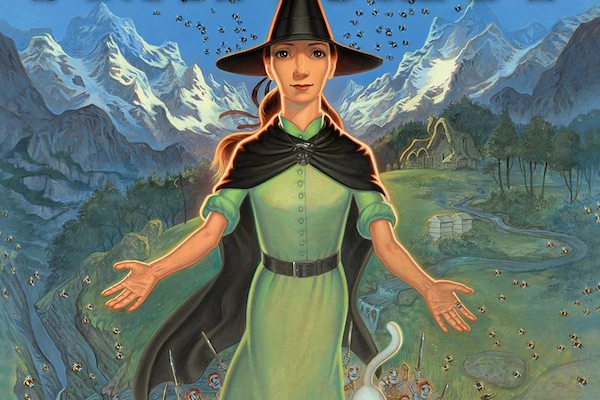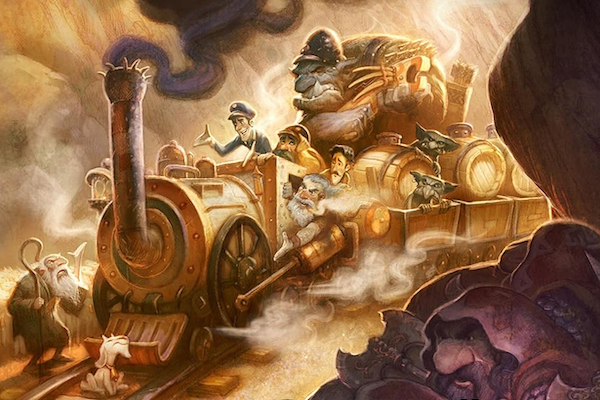I heard that some folks wanted me to do a read of Where’s My Cow, which also appears in this book. Which is a great idea, so I’ll do that as the first read of the new year, after we’ve finished this one!
Summary
There’s the usual Feegle glossary of terms, and then the story begins. Rob Anybody pokes his head up in the middle of a terrible snowstorm, knowing that the Wintersmith has come for their big wee hag. He goes down into the Feegle mound and says it’s time to fetch the “Hero” who hasn’t had many lessons, but will do his job well enough for her. Tiffany has been asked by her father, by her village, to save the lambs and her little brother from the snow (he went out to help the men dig and got lost). She commands them to build a fire and not let it go out. She balances things in her mind and takes the heat of the fire into her to let it burn a tunnel through the snow, unearthing lambs, finally finding her brother. This is her fault, because she danced with the Wintersmith: When the fire goes out, she sees him. We’re told that these events might not happen, but they began last autumn… Tiffany had gone to visit Granny Weatherwax, who showed her the trick of helping heat and cold to swap places, using your own body as the center point that lets everything pass through. Tiffany gave her a kitten, then headed back to Miss Treason’s, a blind and deaf witch she’d been staying with for a few months who is very adept at borrowing animals for senses.
Miss Treason tells Tiffany that tonight they are going to a dance, but won’t give any more information. Tiffany guides Miss Treason through the forest on her broom until they reach a clearing where there are men. Tiffany can hear a beat and they begin dancing, while Miss Treason tells her that she must be silent and not join in; Tiffany recognizes it as the Morris dance, done at the wrong time of year. In the spring, men come with white with bells on, dance through the village, and then summer arrives. But these men are dancing at the wrong time of year and they don’t have the Fool with them. Knowing seven are required to do the dance properly, Tiffany joins the men, and suddenly there’s another presence asking who she is. Far away, Miss Tick has just saved herself from being killed by a suspicious town on account of spreading about a book she’s written called ‘Witch Hunting for Dumb People,’ and has a thought about Tiffany. She makes a shamble and it explodes. The Feegle show up at Miss Treason’s house and she questions them until they admit that the kelda sent them because she’s been having terrible dreams about Tiffany. Tiffany wakes and learns that her dance made something real that should have been metaphor, and that the Wintersmith is now looking for her.
The Feegles give Tiffany a letter from Roland, which they’ve read, as they read all her correspondence to him (and her diary). When Miss Treason chastises Tiffany for her mistake last night, she heads outside and calls to the Wintersmith and he appears, with her horse necklace from Roland. Tiffany knows she shouldn’t take it from him, but she does anyway and it burns her with cold. The Feegles bring her back inside and Miss Treason scolds her again for thinking that the necklace is important to being a witch. Tiffany calls her out about “Boffos,” how a witch uses the art of expectation to get people to listen to them (like Treason’s own special skulls that are from Boffo’s novelty and joke shop). Tiffany goes into the dairy to stop Horace the living cheese from eating butter, then writes in her diary about what’s happened and reads Roland’s letter. After she’s gone to sleep the Feegles steal her diary to read it because Jeannie wants to know what she’s thinking of Roland; Rob thinks that if Tiffany wound up marrying Roland, it would stop him from plowing the Chalk to plant wheat since she’s Granny Aching’s kin, who once stopped the Baron from doing the same. But Billy Bigchin notices that the Wintersmith also seems to have Tiffany on his mind—the snowflakes look like her.
Miss Tick has taken the mailcoach all the way to Granny Weatherwax to figure out how they can help Tiffany, but Granny says the girl is on her own. Roland writes Tiffany another letter and tries to ignore his aunts, who are waiting for his father to die and keep stealing from them. The next day, the 113-year-old Miss Treason tells Tiffany that she’s going to die soon, and has Tiffany send out correspondence and plan the funeral for before she’s gone. No one in town seems to believe that Miss Treason will die, so Tiffany heads to her coven meeting. None of the girls noticed that the snow looked like her, to Tiffany’s disappointment, so she tells Petulia on their way back. Petulia decides that the Wintersmith is behaving like a boy, and that Tiffany should tell him to go away, if that’s the case. Granny and Miss Tick look in on the conversation and Granny sees that Petulia asked the important question: Has the Wintersmith ever even seen a girl? She thinks that Tiffany took the place of Summer in the dance and has confused things, making the Wintersmith more human. They discuss who will take Miss Treason’s place once she dies, and Granny thinks it should be Tiffany. Tiffany sees ice roses in the morning and shows Petulia. Then they prepare for the funeral and talk to all the villagers about how impressive Miss Treason was (though she won’t die until tomorrow).
Commentary
Now that Tiffany is reaching her teen years, the story shifts, and again, the period in which it’s written tells us a lot of what Pratchett is intending to riff on. While there’s very little in common in terms of setting or characters, I find it telling that we’re getting a sort of “love triangle” between Tiffany, Roland, and the Wintersmith at a point in time when those dynamics were just hitting their peak popularity. (Don’t forget, Twilight came out the year before this book.) But, of course, this triangle is far less about the work of finding a romantic partner—Tiffany is growing up, but she’s still a kid at this point—than it is about how it feels to find that you suddenly might care about romantic interest from other people.
Is it a little squiffy that one of those love interests is a fair bit older than her at this point in time? (Roland is four years older than her, making him about seventeen at the point that she’s thirteen.) Yes, but it’s also realistic for the environment that she’s grown up in—not an excuse full stop, but it bothers me less if it’s executed with care the way it is here. And the fact that it doesn’t really move beyond this point helps assuage the weirdness. They write nerdy letters to each other. Roland helps Tiffany expand her knowledge and also gives her an important tie to her home. They both need each other in some capacity, and knowing one another becomes a boon.
As to the romantic piece here, Pratchett balances that act perfectly in Tiffany’s interest being more about the newness of feeling than the desire for active romance in her life. She’s a little excited, awkward, even panicked about the idea of the Wintersmith’s attention. And I appreciate, too, that there’s a vein of the story that discusses the need for this to all take place because it helps smooth out the bits that feel too “convenient” from a narrative perspective, e.g. Miss Treason tells Tiffany that she can’t join the dance, but there’s no explanation as to why, which is a pet peeve of mine. It seems authority figures always want their charges to listen without needed information, which is a bad lesson on its face and obtuse to boot—no one owes you obedience just because you’re old and wise.
But within the confines of this tale, Granny explains that this is something Tiffany has to suss out for herself; making the mistake is, in fact, part of her development as a person. And that’s an important lesson, too, arguably far more important than knowing when to heed the warnings of elders. It has a cost, certainly, but that’s just living in the world. We cannot exist without affecting everything around us, and so the story doesn’t suggest that Tiffany’s mistakes are wrong for the toll they levy, but necessary to her becoming the person she’s meant to be.
And it’s relevant that all of this is occurring when she’s bound to start asking other questions about her life that she hasn’t yet entertained. To that point, we have the section below, where Tiffany is thinking about the lives of the children she’s grown up with, and how different her own life is becoming when compared to her peers:
They were going to do the jobs their fathers did, or raise children like their mothers did. And that was fine, Tiffany added hurriedly to herself. But they hadn’t decided. It was just happening to them, and they didn’t notice.
…I’d be lying if I didn’t admit to having this exact same flow of thoughts at (more than) one point in my life. It comes clear when you follow any sort of path that isn’t what your general community expects. And you always have that same rush to say “Not that there’s anything wrong with that!” because there isn’t, of course. It’s the lack of thought that makes it confusing to people like Tiffany (and me).
We’ll get deeper into death and funerals and probably Boffos next week…
Asides and little thoughts:
- Tiffany wears blue or green because she thinks that the only reason witches wear black is because they always have, and that is the kind of thought process I can get behind. Nothing guarantees that I will flout a rule so readily as “well, that’s just what we’ve always done” without an actual reason attached.
- Granny considers Mrs. Earwig’s sort of witching to be “wizarding with a dress on,” which again gets into the gendered aspects of magic in his world and how it plays into identity, but it’s odd to have this brought up with no mention of Esk… which thankfully won’t be the case forever.
- There’s a bit of Labyrinth about this story, and Legend too, those ‘80s fantasies that play on the coming-of-age trials that girls face, and how fraught they can become when an otherworldly entity is paying you too much attention.
Pratchettisms:
It wasn’t a spell, except in her own head, but if you couldn’t make spells work in your own head, you couldn’t make them work at all.
In the middle of the seesaw is a place that never moves…
Tiffany was an excellent cheesemaker and it did keep them moist, but Tiffany distrusted black cheeses. They always looked as though they were plotting something.
It looked pretty authoritative, too, without too many long (and therefore untrustworthy) words, like “marmalade.”
If a cheese ever looked thoughtful, Horace looked thoughtful now.
They say that there can never be two snowflakes that are exactly alike, but has anyone checked lately?
It wasn’t her fault that people slipped on packed layers of her, or couldn’t open the door because she was piled up outside it, or got hit by handfuls of her thrown by small children.
“But she—“ Miss Tick began, because no teacher like to hear anyone else talk for very long.
Next week we’ll read Chapters 5-8!












